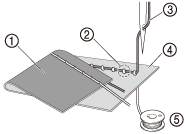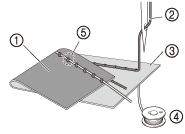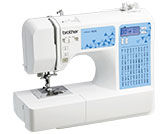FS70
FAQs & Troubleshooting |
Incorrect thread tension
When the thread tension is incorrect, check the machine according the following procedure.
1. Check that the machine is threaded correctly.
- The lower thread is visible from the upper side of the fabric.
- The upper thread appears as a straight line on the upper side of the fabric.
 |
(1) Lower side of fabric (2) Lower thread visible from upper side of fabric (3) Upper thread (4) Upper side of fabric (5) Lower thread |
The lower threading is incorrect.
Return the thread tension dial to “4”, and then refer to Upper thread tightened up to correct the threading.
- The upper thread is visible from the lower side of the fabric.
- The lower thread appears as a straight line on the lower side of the fabric.
- The stitching on the lower side of the fabric is loose or has slack.
 |
(1) Lower side of fabric (2) Upper thread (3) Upper side of fabric (4) Lower thread (5) Upper thread visible from lower side of fabric |
The upper threading is incorrect.
Return the thread tension dial to “4”, and then refer to Tangled thread on wrong side of fabric to correct the upper threading.
2. Check that a needle and thread appropriate for the fabric are being used.
The sewing machine needle that should be used depends on the type of fabric sewn and the thread thickness.
If a needle and thread appropriate for the fabric are not being used, the thread tension will not be adjusted correctly, causing wrinkles in the fabric or skipped stitches.
Refer to Combination of fabric, thread and needle.
3. Select the appropriate setting on the thread tension.
Turn the thread tension dial to select an appropriate thread tension.
The appropriate thread tension differs according to the type of fabric and thread being used.
- Adjust the thread tension while test sewing on a piece of scrap fabric that is the same as that used in your project.
- If the upper threading and lower threading are incorrect, the thread tension cannot be adjusted correctly, even by turning the thread tension dial. Check the upper threading and lower threading first, and then adjust the thread tension.
When the lower thread is visible from the upper side of the fabric.
 |
(1) Lower side of fabric (2) Lower thread visible from upper side of fabric (3) Upper thread (4) Upper side of fabric (5) Lower thread |
Turn the thread tension dial to a lower number (toward the left). (Loosen the thread tension.)

When the upper thread is visible from the lower side of the fabric.
 |
(1) Lower side of fabric (2) Upper thread (3) Upper side of fabric (4) Lower thread (5) Upper thread visible from lower side of fabric |
Turn the thread tension dial to a higher number (toward the right). (Tighten the thread tension.)

